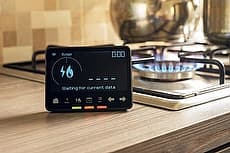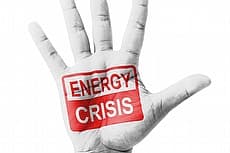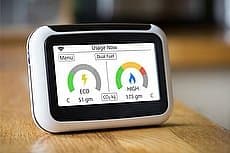Energy market update 2024
Energy prices are still higher than they were before the energy crisis and the price cap is still protecting customers on variable rate tariffs from higher energy bills. Analysts are also predicting prices to come down throughout 2024, after an increase in January.
While we are starting to see energy providers bringing back fixed deals to new and existing customers, standard variable rate tariffs which most energy customers will now be on remain protected by the price cap and will often be the cheapest deals available. In the mean time you can keep up to date with the latest energy news here, or sign up for our newsletter below for further announcements. We've also got a guide to the energy help available.
Latest energy news and updates

02 January 2024
Energy prices increase by 5%
23 November 2023
Energy price cap to rise 5% in January 2024
24 October 2023
Energy companies must do more to support customersHow to compare energy with Choose
What is the energy price cap?
The energy price cap was introduced to the limit the amount providers could charge on their standard variable tariffs (SVT). However, when it was introduced it was very common for providers to offer fixed deals that were much cheaper than their SVTs.
As a result of soaring wholesale energy prices, the majority of energy customers are now on their provider's standard variable tariff - as this has now become the cheapest tariff as a result of it being protected by the price cap.
However, as the cost of energy continues to increase, so too has the energy price cap. While it's set at £1971 as of April 2022 for direct debit customers, it's due to increase in October 2022 and then will be altered to stay in-line with energy prices every three months - so will be updated again in January 2023.
Read more about the energy price cap and how it works.
How do energy rates vary between suppliers?
Energy rates are very similar between suppliers at this time due to the energy price cap limiting what providers can charge. Overall there's only around £50 difference between providers over a year's energy bill on their standard variable tariffs (SVT).
There are very few fixed rate deals available to new or switching customers, and those that are available are very expensive and are much higher priced than the standard variable tariffs protected by the price cap.
For now, an energy provider's standard variable tariff is going to be the cheapest option as it's protected by the energy price cap, and customers coming off a fixed deal should be moved onto their provider's SVT.
What help is available for paying energy bills?
For anyone struggling with their energy bills there is help available - and we have full guides explaining each of the options.
While it's possible more help may be coming from the Government before the winter, at the moment all households will receive a £400 grant towards their energy costs.
In addition, people in receipt of means-tested benefits will also receive a £650 cost of living payment to help with rising bills.
Pensioners will also receive a £300 grant alongside their Winter Fuel Payment of £150 - so it's important anyone eligible ensures they claim this.
Lastly, anyone in receipt of disability benefits will get a £150 grant. It's worth noting that DLA and PIP recipients aren't entitled to the cost of living payment for means-tested benefit recipients.
For more information on the help available see this guide to the energy crisis help. We also have information on help for winter fuel bills, and grants for anyone who is already struggling with energy debt.
Can I get help to pay for home insulation?
The ECO4 scheme for free home insulation replaced the previous ECO3 scheme in 2022.
The ECO4 scheme offers grants to pay for insulation including loft and cavity wall insulation, solid and internal wall insulation, and new A-rated storage heaters for those reliant on electric heating.
To be eligible applicants must be in receipt of at least one of the following benefits: Child Benefits; Child Tax Credits; Jobseekers Allowance; Employment and Support Allowance; Income Support; Pension Credit Guarantee Credit or Savings Credit; Universal Credit; Working Tax Credit; Housing Benefit; or Warm Home Discount Scheme Rebate.
For more information see our guide to energy help here.
How can I reduce my energy usage?
With energy prices becoming so expensive many people may want to find out how they can reduce their usage to minimise the cost of their energy bills.
We have a guide to the most expensive household appliances here, and also information on energy monitors to keep track of energy usage.
While it can be helpful to reduce our usage, certain appliances like boilers and freezers shouldn't be switched off. Boilers can often be turned down to a lower setting, but keeping them running helps reduce the chance of pipes freezing and damp building up in a property.
Making small changes can often be the best approach, for example taking shorter showers, sharing bath water, making up a flask of hot water when we boil the kettle, and installing draught excluders. We've more tips on cutting energy usage here.
What should I do if my energy firm has gone bust?
While the energy market has largely stabilised from the collapses last year, anyone who is affected simply needs to sit tight as the energy regulator Ofgem will step in and ensure a customer's energy supply is not affected.
It can be useful to take energy meter readings, but customers will automatically be switched to another provider to ensure their service continues without any disruption.
Read more about the suppliers that collapsed last year, or find out what happens when an energy supplier goes bust.
Can I get back my energy bill credit?
With energy prices increasing some providers have been increasing customer direct debit amounts to ensure they have enough credit built up for the winter months.
While it can be useful to start building up some credit now so money is available when the cold weather means more energy needs to be used to keep warm, some people may also feel they have too much credit in their energy accounts.
While energy firms are obliged to consider credit refund requests, there have also been recent complaints that energy providers are keeping too much credit in a customer's account, and that's currently being looked into by Ofgem.
In the meantime, we have a full guide on how to claim credit balance refunds to find out more about how the process works.
Should I get a smart meter?
Smart meters send energy usage readings back to providers automatically over wireless mobile networks. This means customer bills can be more accurate, ensuring people aren't paying too much, or too little and then end up being surprised with large catch-up bills.
For prepayment customers, smart meters also make it possible to top-up easily online, so people don't have to go to a shop or wait for opening hours.
While people don't have to accept a smart meter installation, energy providers have set targets to ensure the smart meter rollout happens and all old meters are eventually replaced.
Read more about smart meters and the rollout here.
How do I find more information on energy?
For more information on various energy topics see our comprehensive guide covering topics including the energy crisis; how to read an energy bill; how to switch suppliers; how to complain and more.
To find the information you need use our search page or browse our energy guides here.












